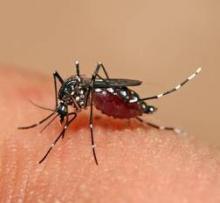A live-attenuated dengue vaccine was about 30% effective in preventing dengue infections and was well tolerated in a study of healthy children in Thailand, providing evidence for the first time that a safe and effective vaccine for dengue could eventually become a reality, according to Dr. Arunee Sabchareon and her associates.
"Although the assumed high efficacy against all four serotypes of dengue virus was not shown, our study constitutes the first ever demonstration that a safe dengue vaccine is possible," concluded Dr. Sabchareon of the department of tropical pediatrics at Mahidol University, Bangkok, and her colleagues. The study was published online Sept. 11 in the Lancet (doi: 10.1016/S0140-6736(12)61428-7).
There are four dengue virus serotypes that are pathogenic, which has been one of the main challenges in developing a vaccine against the disease, they said. There is currently no licensed dengue vaccine available despite almost 50 years of research, but several dengue vaccines are in early clinical or preclinical stages, they noted.
The "CYD-TDV" vaccine – a recombinant, live, attenuated, tetravalent dengue vaccine used in this trial – has been studied in phase I and II trials.
In this controlled, phase IIb "proof-of-concept" study, randomized healthy Thai schoolchildren aged 4-11 years living in a dengue endemic area outside Bangkok received three doses of the dengue vaccine (2,669) or a placebo or rabies vaccine (1,333 children) at 0, 6, and 12 months, between February 2009 and February 2010.
During 25 months of follow-up, 134 of the children had virologically confirmed dengue, including 4 children who had two episodes, for an overall efficacy of the vaccine of 30.2%. Dr. Sabchareon and her associates also analyzed efficacy by serotype, and found that efficacy ranged from 61.2% against the DENV1 serotype, to 81.9% against the DENV3 subtype, to 90% against the DENV4 subtype.
The researchers evaluated immune responses to the vaccine in a subset of 300 patients, and determined that mean antibody titers against dengue virus were increased after the first dose, and levels after the second and third doses were higher compared with the first dose.
During the 2 years of follow-up after the first dose, there were no serious adverse events associated with the vaccine, and no safety signals were detected.
Considering the World Health Organization’s goal of cutting dengue mortality by half and morbidity by at least 25% by 2020, "this study represents a major milestone," and the results "support the continued evaluation of this dengue vaccine," Dr. Sabchareon and her associates wrote.
The vaccine is currently being studied in phase III trials in more than 30,000 people in Latin America and Asia, they said.
About half the people in the world are at risk for dengue. The World Health Organization estimates that every year, 50-100 million people have dengue infections, and that about 500,000 are hospitalized for severe dengue.
The study was funded by Sanofi Pasteur; eight of the authors are Sanofi Pasteur employees who own stock options or shares in the company. The eight other authors, including Dr. Sabchareon, had no conflicts of interest to disclose.


